- Home
- Carré White
An Unexpected Love (The Colorado Brides Series Book 5)
An Unexpected Love (The Colorado Brides Series Book 5) Read online
The Colorado Brides
Book Five
An Unexpected Love
Carré White
Copyright © 2013 Carré White
All Rights Reserved
Kindle Edition
http://carrewhite.wordpress.com/
http://twitter.com/CarreWhite
Carré White’s Mail List
Email:
[email protected]
All characters appearing in this work are fictitious. Any resemblance to real persons, living or dead, is purely coincidental.
This book contains material protected under International and Federal Copyright Laws and Treaties. Any unauthorized reprint or use of this book is prohibited. No part of this book may be reproduced or transmitted in any form or by any means, electronic or mechanical, including photocopying, recording, or by any information storage and retrieval system without express written permission from the author.
Contents
Chapter One
Chapter Two
Chapter Three
Chapter Four
Chapter Five
Chapter Six
Chapter Seven
Chapter Eight
Chapter Nine
Chapter Ten
Chapter Eleven
Chapter Twelve
Chapter Thirteen
Chapter Fourteen
Chapter Fifteen
Epilogue
Preview
Chapter One
The Colorado Territory, May 1865
I was late getting my brothers and sisters off to school. My step-parents, Fanny and Pastor Bailey, were in the mountains at Golden Creek attending a gathering of ministers from the area. It was my responsibility to take care of everyone, making sure they did their homework and arrived to school on time…but every morning had been a struggle.
“Hurry up!” I shouted. “We’ll be late!” I stood on the front porch, tapping my foot.
The farmhouse had been built after Fanny and Jack’s marriage. They had put in a claim on the land, which had been approved by the mining district. Leaving Denver City was fortuitous, as there had been a devastating fire two years ago that had nearly burned down the entire town. Most of the buildings and cabins had been made of wood. Reconstruction began immediately, but the loss had devastated many businesses, and people had been forced to leave. We had moved into the farmhouse only weeks before the infamous blaze.
“For heaven’s sakes! Hurry up!”
“I’m comin’,” said Peter, who was twelve-years-old. He hadn’t brushed his hair, as the strands were flattened on one side.
“Where’re Connor and Susanna and Mary?”
“Finishing breakfast.”
I closed my eyes, praying for patience. “I woke you up with plenty of time. This is inexcusable.” Every single morning since Fanny’s departure, the children had been late. My stepbrother, Thomas, who was two-years-old, was a handful. Fanny had taken him along on the trip, saving me from having to watch him as well.
The front door swung open, as Mary and Susanna emerged, dressed in blue and purple calico with matching bonnets. Connor followed them, striding slowly. They carried schoolbooks and lunch pails. I held the reins of a docile, pretty grey mare, while the boys climbed onto the back. The girls sat with me on a sturdy wooden bench.
“Did you forget anything? Is the stove off?”
“It’s off,” said Mary, yawning. “Golly gosh, I’m tired.”
Due to Fanny and Jack’s absence, I had slept in their bedroom, feeling like I was the queen of the house. I had heard my sisters talking late into the night. It was no wonder they were exhausted.
“We’re off then.” I called to the horse, “Go on, Sally Anne.” The wheels began turning. “We’ll be late. We should’ve left ten minutes ago.”
“Sorry, Jane,” said Susanna. She too proceeded to open her mouth in a lengthy yawn. “It’s so early.”
“You’re all taking advantage of me. You think you’re going to get away with this behavior, but I’ll be speaking to Fanny about it when she returns.”
Mary gave me a look. “We can be a little late. Miss Cox is a forgiving sort of woman…mostly.”
“That’s beside the point. You just want to miss arithmetic, because you didn’t finish your homework.”
“You wouldn’t help me with it.”
“Don’t pin this on me.” I lifted my chin determinedly, urging the horse to go faster. “Oh, do hurry, Sally Anne. Go, girl, go.” Town was twenty minutes way, and, if we picked up the pace, we might arrive on time.
Being eighteen, I had completed twelfth grade last year. It was only a matter of time before Wesley Hornsby asked for my hand in marriage. We had been sweethearts since I was fifteen, after I had stupidly run away from home. That was the year after my parents had passed away, and we had been sent to live in Denver City with my uncle, Jason Hatch. He had married Fanny, briefly, before succumbing to a heart malady and passing away. It had been a turbulent year, and I had rebelled against Fanny, hating her and blaming her for all the misery I had experienced, as she was now my guardian. I knew she wasn’t to blame, but I could not help myself from being overly dramatic about everything. Then there was that silly, misplaced infatuation I’d had on Pastor Bailey, although, even to this day, he was one of my favorite people. I adored that man.
“Aren’t we going too fast?” asked Susanna. The wagon seemed to hit each and every bump in the road.
I gritted my teeth. “It’s a little rough, but this is how we’ll get there on time.” I was determined to bring everyone to the school by nine, sharp. Nothing would stop me. We encountered ruts that sent the wagon into violent spasms, flinging the boys from side to side, their shouts of amusement ringing out.
“Faster, Jane!” yelled Peter. “Go faster!”
“I really shouldn’t.” It had rained last night, and there were puddles in places, but none of them seemed especially deep.
“What’s for dinner?” asked Connor. “Please don't say stew again.”
“I haven’t a clue.” I glanced at Mary. “Maybe you should cook tonight.”
“I’m plain outta ideas.”
“That’s not helpful.”
“I want Gold Cake for supper,” said Connor.
Peter grinned. “Me too.”
“That’s a dessert. You can’t live on dessert.”
“Yes, we can, Jane,” said Peter affirmatively. “We most certainly can.”
“I might be able to make something with pasta and dumplings, if we have the ingredients,” said Mary.
My mouth watered at the thought. “That would be wonderful. I could help you.” I gazed at my sister, pleased that she had thought of something delicious.
“We might have to kill a chicken,” she warned.
“That’s fine.”
“I’m not killing a chicken,” said Susanna. “No thank you.” She crossed her arms over her chest. “I’m not plucking one either.”
“I’ll pluck it,” offered Peter. “I got no qualms about that. I ain’t no sissy.”
“I’ll catch it,” said Connor. “They sure are slippery critters.”
“It’s settled then,” I said happily. “Chicken dumplings it—” The wagon suddenly ground to a halt, upsetting the horse, as it reared up into the air, flailing its front legs. “Tarnation!” A wheel lodged in a brownish puddle, which had hidden a deep rut. “Are you all right?” I glanced at the boys, as they had been thrown back and forth.
“That was fun, Jane!” shouted Connor. “Can we do that again?”
“There, there, Sally Anne,” I soothed. “I’m sor
ry about that.” Her ears were back, displaying displeasure. “I have to get out. We should all get out. I’m sorry, but I’ve got to free the wagon.”
Susanna grumbled, “Oh, fiddlesticks! Now we’ll really be late.”
“Why must we get out?” asked Mary.
“It’s too heavy. Sally Anne has to pull the wheel loose, and it’ll be easier without our added weight. So, everyone out!”
The boys jumped to the ground, avoiding the puddle, while Susanna lifted her skirts and daintily stepped away from the muck. I approached Sally Anne, but the horse shook her head, neighing unhappily. Oh, dear. I held the reins, keeping my distance, as she was out of sorts now. I murmured something soothing, hoping this would calm her. While my brothers and sisters watched, I tried my best to encourage her to walk forward, hoping to dislodge the wheel.
“Oh, please, Sally Anne. Come forward, girl. I need you to move. Let’s free this wagon so we can go.”
“Smack her in the rump,” said Peter. “That’ll do it.”
“I can’t. That’s the worst thing yet. She’s already spooked from the accident.” I tugged on the reins, hoping she would heed my entreaty, but her legs seemed stubbornly rooted to the spot. “Oh, please move, Sally Anne.” I glanced at Mary, feeling desperate. “What shall I do?”
“Pull a little harder, I suppose.”
“Oh, this was the last thing we needed today. Now we’ll truly be late.” There was movement out of the corner of my eye, a man on horseback, heading in our direction. Hope flared eternal. “Maybe he can help us. It might not be such a disaster after all.”
My sisters stared in the stranger’s direction. “Who is that?” asked Susanna. “Is that Mr. Bowler?” He was one of our neighbors.
I craned my neck. “I don’t think so. He…looks younger.” The rider approached steadily. His broad-brimmed hat hid most of his face, while lean, strong-looking thighs straddled a dark-colored horse. “It’s no one I know.” I stood before Sally Anne holding the reins, hopeful this person might help us. He’d come close enough now where we were able to see his features.
“He’s an Indian!” shouted Connor, who broke into a sprint, dashing into the field. “Run for your lives!”
Before I was able to process what had just happened, Peter, being older than Conner, stood his ground, his expression was fierce. “I’ll protect you girls. Don’t worry. I might not have a weapon, but—but I’ll find something.”
“Oh, stop that,” admonished Susanna, who glared at her brother. “He’s perfectly fine.” She glanced at the stranger. “Aren’t you, sir?”
He removed his hat, exposing nearly black, silky hair, which fell to his shoulders. “Ryan Hartsock. What seems to be the problem, ladies?” He eyed Peter. “And gentlemen.”
“See,” said Mary. “He speaks English perfectly. Where did Connor go, that chucklehead?”
“Sir,” I said. “Our wagon’s stuck. I can’t get the horse to move.”
He dismounted, handing the reins to Peter. “Could you hold him, please?”
“Is that a stallion?” The boy’s mouth gaped; his eyes were round as saucers.
“Yes, it is.”
“That sure is a nice horse, mister.”
“Thank you.”
I stared at Mr. Hartsock, which was rude, but I couldn’t help it. He was indeed of Indian heritage, but his manners were civilized, and I couldn’t help wondering who he was and where he had come from. He towered over me; his shoulders were broad, encased in a yellow tow shirt, while a leather belt emphasized the leanness of his waist.
“If I may.” He took the reins from me, tugging on the end, while murmuring, “Easy girl, easy.”
Sally Anne’s big black eyes were pinned on him, eyeing him warily. It seemed as if she would object; her ears were still back, but he wouldn’t let up on the line, pulling even harder, until she bolted forward. The wagon attached to her creaked and groaned, the harness rattling. The wheel that had been stuck was coated in mud, but it was free now. He’d accomplished the task with relative ease.
“Oh, thank you kindly, sir,” I gushed. “I guess I should’ve taken a sterner hand with her, but I lacked the confidence.”
Ryan encouraged the horse forward, clearing the wagon completely. “Here you are.” He handed the reins to me.
“Thank you. It was a good thing you came along. We’re already so late.” His eyes were the color of melted chocolate, surrounded by thick black lashes.
“You didn't say who you were.”
“I’m Jane. Jane Hampton.”
“You look awfully young to have so many kids, Mrs. Hampton.”
He had to be teasing. “These are my brothers and sisters, sir,” I giggled, because it was outrageous to think that I could have a sixteen-year-old daughter, as that was Mary’s age. “Hampton is my maiden name. I am unmarried.”
“Is it safe?” asked Connor, who had hidden in the bushes.
“Oh, come out, you numbskull,” laughed Peter. “He’s fine. He’s no Indian, but he sure looks it.”
“Actually, I’m half-Indian. My mother was Ute.” He seemed to wait for some sort of response to this statement, and, when there was none, he tipped his hat. “Have a safe journey.”
“Get in the wagon please. We had best be going.” I wanted to say something else to the man who had rescued us, but he’d returned to his horse, mounting, while pressing his boots into the glossy flanks. “Good day, sir!” I called. “Thank you again.” He held up a hand, as he trotted off. Once we were situated, I snapped the reins, and Sally Anne continued on, as if nothing out of the ordinary had happened.
“He was interesting,” murmured Mary. “He was completely clean-shaven. Not a hair on his face.”
“No, there wasn’t, was there?” said Susanna. “He was handsome, though, and kind. I could find no fault with him at all. It’s too bad for the Indian part.”
“What do you think he’s doing here?” asked Mary. “Is he a scout or something? Maybe he speaks Indian.”
“I think it’s called Numic. That’s their language,” I said. “The Utes have been driven further into the mountains. I doubt he’s a scout. He more than likely works for one of the ranches around here. That would be the logical explanation.”
Last year there had been an attack on a family near Box Elder Creek. A mother and her two children had been brutally murdered and scalped. Having seen smoke in the distance, the father had arrived to help, but he too had met an untimely end. It had been a great shock to the people of Denver City, and, as a consequence, the general fear of Indians had grown.
I couldn’t help thinking about our encounter with Ryan Hartsock, even after I had delivered my family to school, safe and sound. They were late, by more than a half an hour, but I had explained to Miss Cox that our wagon had an accident, and she had understood.
The school hadn’t been rebuilt yet, and it was located in a public hall. Because of the fire, most of the shops had been constructed of brick and mortar. Before the blaze, Denver City had looked like a temporary campsite, yet it had all the trappings of a real town now. However, the reconstruction efforts had slowed because the war had seen a reduction of men, since they had gone east to fight. Most Denverites had been on the side of the Union, driving out the southerners, including the mayor, John C. Moore. The free gold that had been found in shallow veins had been depleted, and there was little money for new mines, infrastructure, or farming. These were lean years for the town, as people left in droves, but the Hoffmans had decided to carry on. Hannah, Fanny, and Paulina all had farms, and they continued to do well, despite the hardships the city had seen. To add insult to injury, there had been a flood last spring, which had proved devastating to those living in Auraria. It had been the final straw for many people, and they had gone back east.
There were chores waiting for me at home, and I didn’t want to delay any longer than I had to. Fanny and Jack would be gone for several days still, and there was much to do in their absence. As I turned th
e wagon around, I trundled past the saloon, which had its doors open day and night. The patrons drank, even on Sunday, as if they hadn’t a care in the world. Hannah had attempted to form a temperance league with her friends, Rhoda Caldwell, Adaline Ross, and Sally Higgins, but the movement had gone nowhere, and the drinking and debauchery was just as bad as ever.
I was nearly clear of the establishment, with its bawdy music and laughter, when something flew over my head, nearly hitting me. Shocked, I gaped at the man who had thrown the bottle, but I had not been the intended target.
“We don’t want no Indians! Get on outta here!”
Glancing over my shoulder, I spied Mr. Hartsock, who had arrived before me. The beautiful stallion had been tied to a hitching post in front of the post office. He’d removed his hat for a moment, exposing his ethnicity, which had prompted the man to throw the bottle. Appalled at how he had been treated, I wanted to say something, but Mr. Hartsock stepped into the stirrup, throwing a leg over the horse, seemingly unperturbed by these events. He gave a cursory glance at his nemesis, who stood on the boardwalk with his hands on his hips. He spotted me as well, but he said nothing. Without another word, he trotted away, his horse choosing that moment to defecate in the thoroughfare.
Chapter Two
Managing my brothers and sisters alone was something I had gotten used to over the years since my parents had died. Fanny and Jack were due to return by Friday, and, as the week wore on, I gratefully anticipated their arrival. When things ran smoothly, the mornings were easy: the cow was milked, the chickens fed, and the clothing taken in on the line. The opposite occurred, if I did not get my siblings up on time. I would have to hurry home from town to finish the chores, which were added to all the other things I needed to do. I helped Fanny with housework every day, but doing nearly everything alone had taken its toll.
By Thursday night, I was at my wit’s end. There were dishes piled high in the sink, two pots crusted with food, and the floor needed sweeping. We’d not finished homework either, as there would be a Geography test in the morning.

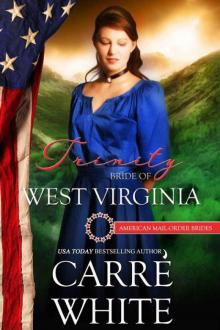 Trinity: Bride of West Virginia (Amercan Mail-Order Bride 35)
Trinity: Bride of West Virginia (Amercan Mail-Order Bride 35)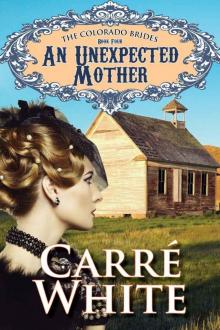 An Unexpected Mother (The Colorado Brides Series Book 4)
An Unexpected Mother (The Colorado Brides Series Book 4)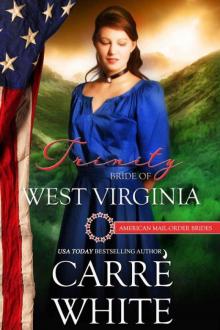 Trinity_Bride of West Virginia
Trinity_Bride of West Virginia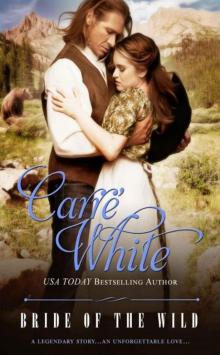 Bride of the Wild
Bride of the Wild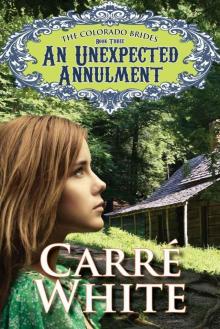 An Unexpected Annulment (The Colorado Brides Series Book 3)
An Unexpected Annulment (The Colorado Brides Series Book 3)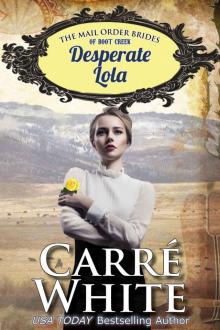 Desperate Lola (The Mail Order Brides of Boot Creek Book 2)
Desperate Lola (The Mail Order Brides of Boot Creek Book 2)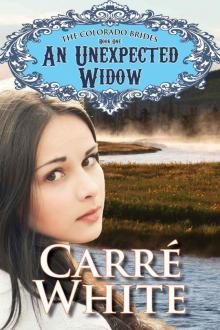 An Unexpected Widow (The Colorado Brides Series)
An Unexpected Widow (The Colorado Brides Series) Western Kisses – Old West Christmas Romances (Boxed Set)
Western Kisses – Old West Christmas Romances (Boxed Set)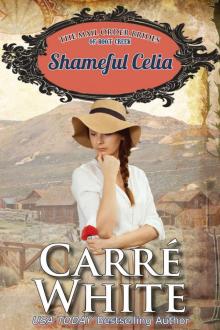 Shameful Celia (The Mail Order Brides of Boot Creek Book 3)
Shameful Celia (The Mail Order Brides of Boot Creek Book 3)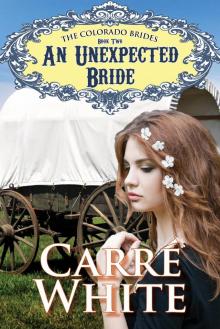 An Unexpected Bride (The Colorado Brides Series Book 2)
An Unexpected Bride (The Colorado Brides Series Book 2) An Unexpected Love (The Colorado Brides Series Book 5)
An Unexpected Love (The Colorado Brides Series Book 5)